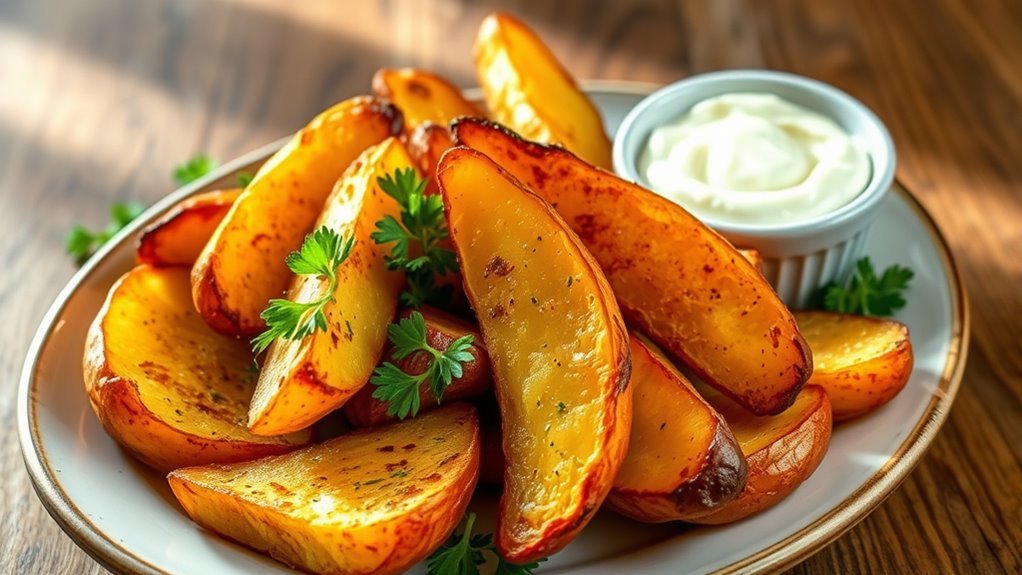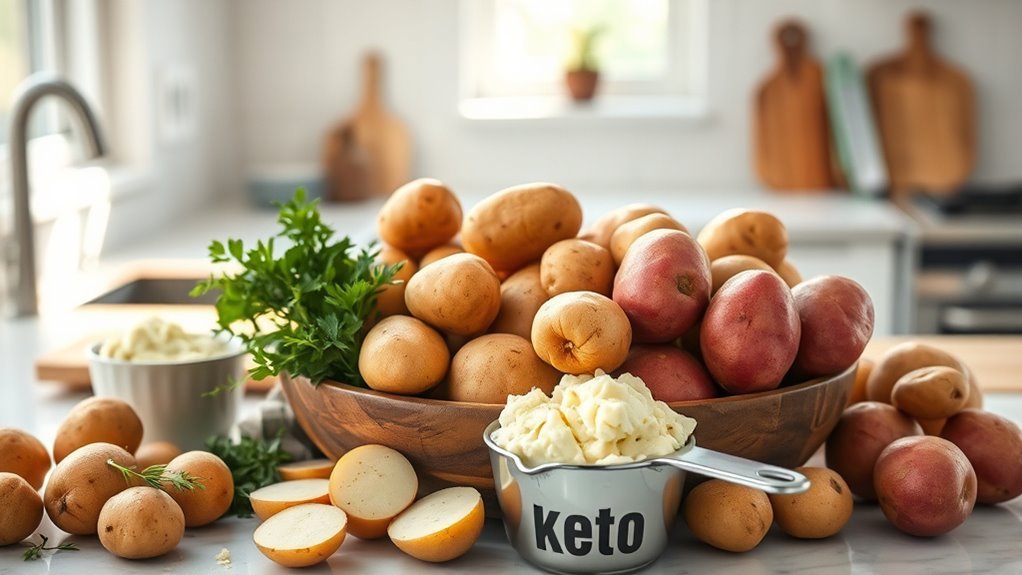While potatoes are delicious, they’re high in carbs, making them challenging for a ketogenic diet focused on low carb intake. A medium potato can contain around 34 grams of net carbs, which could disrupt ketosis. However, small portions might be used creatively alongside low-carb vegetables. Exploring alternatives like cauliflower or zucchini can help you enjoy similar flavors without the carbs. If you’re curious about integrating potatoes wisely or finding alternatives, there’s a lot more to discover.
Understanding the Ketogenic Diet

When you’re exploring the ketogenic diet, it’s essential to understand its core principles. The keto diet focuses on high-fat, moderate-protein, and very low-carbohydrate intake, pushing your body into a state of ketosis. This metabolic shift can lead to numerous keto benefits, including weight loss, improved energy levels, and better mental clarity. However, it comes with specific diet restrictions, such as limiting foods high in carbs like grains, sugars, and certain fruits. Embracing these changes can feel liberating, allowing you to experience new flavors and meals while feeling more in control of your health. Remember, it’s about finding a balance that works for you, enabling freedom in your food choices while still adhering to the principles of the ketogenic lifestyle.
The Carbohydrate Content of Potatoes

When considering potatoes on a ketogenic diet, it’s essential to understand their carbohydrate content. A medium potato can contain around 30 grams of carbs, which greatly impacts your daily intake and may challenge your ability to maintain ketosis. By calculating the net carbs and examining their nutritional profile, you can make informed choices that align with your dietary goals.
Nutritional Profile Overview
Potatoes, often celebrated for their versatility and taste, are also known for their carbohydrate content, which is a critical aspect for those following a ketogenic diet. When assessing the nutritional profile of potatoes, you’ll find key aspects to evaluate:
- Carbohydrates: Different potato varieties have varying carbohydrate levels, generally ranging from 15 to 30 grams per medium potato.
- Dietary Fiber: While potatoes do contain some dietary fiber, it’s not enough to considerably offset their carb load, with about 2 grams per medium potato.
- Micronutrients: Potatoes offer vitamins and minerals, such as vitamin C and potassium, but these benefits come with a high carb content.
Ultimately, understanding these factors is essential for making informed dietary choices while traversing a keto lifestyle.
Net Carbs Calculation
Although it might be tempting to include potatoes in your meals, understanding the net carbs they contribute is vital for maintaining ketosis. Potatoes are high in carbohydrates, with a medium-sized one containing around 37 grams of total carbs. To calculate net carbs, subtract fiber from the total carbs, which gives you about 34 grams of net carbs per medium potato. For those serious about carb counting, this amount can quickly exceed your daily limit on a ketogenic diet. While potatoes offer nutritional benefits, their high net carb content can pose a challenge. If you’re aiming for freedom in your diet while staying in ketosis, it’s important to be mindful of what you include, especially with starchy vegetables like potatoes.
Impact on Ketosis
The high carbohydrate content of potatoes can considerably impact your ability to maintain ketosis. Consuming potatoes might lead to spikes in blood sugar, which can hinder ketosis effects. Here are three key points to evaluate:
- Carbohydrate Load: A medium potato contains around 37 grams of carbs, far exceeding the daily limit for a typical keto diet.
- Insulin Response: Eating potatoes can trigger insulin release, promoting fat storage instead of fat burning.
- Potential Cravings: The blood sugar fluctuations from potato consumption could lead to cravings for more carbs, making it harder to stay on track.
In short, if you’re aiming to enjoy the benefits of ketosis, it’s best to steer clear of potatoes and opt for low-carb alternatives.
Types of Potatoes: Which Are Better for Keto?

When considering potatoes on a keto diet, it’s important to explore low-carb alternatives that can fit your meal plan. Different varieties of potatoes have varying carbohydrate levels and nutritional profiles, which can impact your ketosis goals. By comparing these options, you can make informed choices that align with your dietary needs.
Low-Carb Potato Alternatives
If you’re following a keto diet, finding low-carb alternatives to traditional potatoes can be essential for sticking to your carbohydrate limits. Fortunately, there are plenty of delicious substitutes that can satisfy your cravings without derailing your goals. Here are three popular options:
- Cauliflower Mash – A creamy, buttery alternative to mashed potatoes that’s low in carbs and high in flavor.
- Zucchini Fries – These crispy, baked fries make for a satisfying snack or side dish while keeping your carb count down.
- Radish Hash – When sautéed, radishes take on a mild flavor and a texture similar to hash browns, making them a unique choice.
These options offer the freedom to enjoy flavorful dishes without compromising your keto journey.
Nutritional Comparison of Varieties
Which types of potatoes can you enjoy while still adhering to a keto diet? While most potato varieties are high in carbs, some have nutritional differences that may fit better into your low-carb lifestyle. Here’s a quick comparison:
| Potato Variety | Net Carbs per 100g |
|---|---|
| Russet Potatoes | 17g |
| Sweet Potatoes | 20g |
| Red Potatoes | 15g |
| Cauliflower (as a substitute) | 3g |
For keto, you’ll want to limit your intake of traditional potatoes. Instead, consider alternatives like cauliflower, which offers a much lower carb count and still satisfies your craving for comfort food. Always check nutritional labels to stay informed!
Low-Carb Alternatives to Traditional Potatoes
While traditional potatoes are a staple in many diets, those following a ketogenic lifestyle often seek low-carb alternatives that can satisfy cravings without derailing their progress. Here are some delicious options to evaluate:
- Cauliflower mash: This creamy dish mimics mashed potatoes, providing a similar texture with far fewer carbs.
- Zucchini fries: Baked or fried, these crispy delights make a great side without the extra carbs.
- Radish hash: When cooked, radishes lose their sharp flavor and can be sautéed for a hearty hash.
Other alternatives include turnip wedges, kohlrabi noodles, and eggplant slices, each offering unique flavors and textures. These substitutes not only keep your meals interesting but also align with your keto goals, granting you the freedom to enjoy your diet!
How to Incorporate Potatoes Into a Keto Meal Plan
Although traditional potatoes are typically high in carbs, there are ways to incorporate them into a keto meal plan without completely sacrificing your dietary goals. Focus on potato preparation methods that minimize carb content. For instance, try using smaller amounts of boiled or baked potatoes alongside low-carb veggies. You can also explore keto substitutions, like cauliflower or radishes, which can mimic the texture of potatoes in dishes like mash or casseroles. Experiment with seasoning to enhance flavor and keep meals enjoyable. Remember, moderation is key—enjoying a small portion of potatoes can add variety while keeping you within your carb limits. By balancing your meals thoughtfully, you can enjoy the freedom of including potatoes in a satisfying keto lifestyle.
Portion Control: Staying Within Your Carb Limits
To successfully maintain a keto lifestyle, it’s essential to master portion control when it comes to high-carb foods like potatoes. By being mindful of your portion sizes, you can stay within your carb limits and enjoy potatoes without derailing your diet. Here are some effective strategies:
- Meal Planning: Incorporate potatoes in small amounts to keep your meals balanced.
- Serving Suggestions: Aim for a quarter-cup serving of potatoes, which allows you to savor the flavor without overindulging.
- Food Swaps: Use cauliflower or zucchini as low-carb alternatives when you’re craving potato dishes.
Creative Keto Recipes Featuring Potatoes
Finding ways to enjoy the flavors of potatoes while sticking to a keto diet can be a delightful challenge. One creative option is keto potato salad, where you can swap traditional potatoes for diced cauliflower, mixing in mayo, mustard, and your favorite seasonings for a creamy, satisfying dish. Another fantastic alternative is cauliflower mash, which mimics the texture of mashed potatoes beautifully. Simply steam cauliflower, blend with butter, cream, and garlic for a comforting side. You can even add cheese or herbs to elevate the flavors. These dishes maintain the essence of potatoes while keeping your carb intake in check, allowing you to enjoy delicious meals without feeling restricted. Embrace these recipes and savor the freedom of flavorful keto cooking!
The Importance of Tracking Your Macros
While adopting a keto diet can lead to significant weight loss and improved health, tracking your macros is vital for achieving and maintaining those results. Macros tracking helps you understand your nutrient intake, making it easier to stay within your carb limits and enjoy the freedom of food choices. Here are three reasons why this awareness is important:
Tracking your macros is essential for success on a keto diet, helping you meet goals and maintain nutritional balance.
- Goal Alignment: Guarantees you’re meeting your specific dietary goals.
- Nutritional Balance: Helps you maintain a healthy balance of fats, proteins, and carbs.
- Adaptation: Allows you to adjust your intake based on how your body responds.
Frequently Asked Questions
1. Can you eat potatoes on a keto diet?
No, potatoes are generally not considered keto-friendly. They are high in carbohydrates, which can hinder the state of ketosis that the keto diet aims to achieve. A medium-sized potato contains about 37 grams of carbs, which exceeds the typical daily carb limit of 20-50 grams on a keto diet.
2. What are the carbohydrate contents of different types of potatoes?
Different types of potatoes vary in carbohydrate content. For example, a medium-sized russet potato has around 37 grams of carbs, while a similar-sized sweet potato contains about 26 grams. Even smaller varieties, like baby potatoes, can have significant carbs, making them unsuitable for a keto diet.
3. Are there any alternatives to potatoes that are keto-friendly?
Yes, there are several keto-friendly alternatives to potatoes. Cauliflower is a popular substitute due to its low carb content and versatility. You can make cauliflower mash, rice, or even pizza crust. Other alternatives include turnips, rutabagas, and various types of squash, which can mimic the texture and flavor of potatoes without the high carb count.
4. Can I occasionally include small portions of potatoes in my keto diet?
While it is possible to include small portions of potatoes occasionally, it is crucial to monitor your total carbohydrate intake for the day. If you choose to include them, you may need to adjust other carbohydrate sources in your diet to stay within your daily limits. However, frequent consumption of potatoes can make it challenging to maintain ketosis.
5. What should I consider when following a keto diet regarding vegetables?
When following a keto diet, focus on low-carb vegetables, such as leafy greens, broccoli, zucchini, and bell peppers. These vegetables provide essential nutrients without significantly impacting your carbohydrate intake. Always read nutritional labels and be mindful of portion sizes to ensure you maintain ketosis while enjoying a variety of vegetables.
References
- https://www.healthline.com/nutrition/are-potatoes-keto-friendly
- https://www.webmd.com/diet/obesity/news/20200804/keto-diet-tips-and-advice
- https://www.ncbi.nlm.nih.gov/pmc/articles/PMC5840482/
- https://www.mayoclinic.org/healthy-lifestyle/nutrition-and-healthy-eating/expert-answers/keto-diet/faq-20455162
- https://www.cdc.gov/healthyweight/healthy_eating/index.html
- https://www.purdue.edu/newsroom/releases/2020/Q3/potatoes-can-boost-keto-diet-while-supporting-overall-health.html


